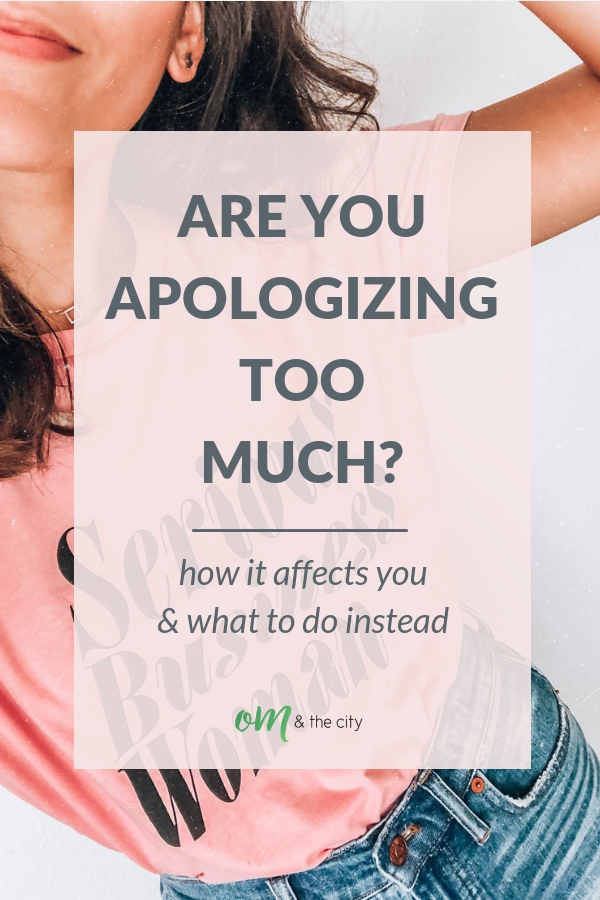The Problem with Over-Apologizing and How to Reframe it
One thing I’ve become more mindful of in my daily life is cutting down on using unnecessary apologies. Sure, a sorry here and there might seem polite and well-intentioned enough, but have you noticed this word in your conversations like it’s on repeat? If so, that’s your cue that it’s time to reframe! As women especially, we tend to over-apologize for the smallest of things. The root of over-apologizing is the idea of not wanting to take up space, cause inconvenience or disrupt, but your words are valid, you deserve a seat at the table, and you most certainly deserve to take up space. It’s your space to own.
Growing up as young women in our society we are often told to be sweet, pretty, polite, and ladylike. I was personally very soft-spoken growing up, and I didn’t make a fuss or would rarely speak up when something bothered me. Wanting to avoid conflict, I would often tip-toe around conflict, not quite getting my point across and therefore not getting the end result I wanted.
Looking back, I often took the high road or the ‘kill ‘em with kindness’ approach. While I’m still very much a big believer in spreading kindness and picking and choosing battles, I’m not a believer in silencing a voice that needs to be heard.
As I’ve matured, I’ve also gained confidence - I have 6+ years in NYC to thank for that! I found my voice, I say exactly what’s on my mind, and I’ve learned we can all be bold women who are also kind, effective, and intelligent without sugar coating it. I’ve learned to ask for what I want, know my worth, and not be afraid to own my space.
Own the Intentions of Your Words
Throwing casual sorry’s around has a tendency to actually devalue the word, making a genuine apology appear less meaningful. Over-apologizing can also make you seem guilty to others when there’s no need and can impact the way we perceive ourselves as well.
That’s not to say there isn’t a time and a place for the s-word. Giving a heartfelt apology when it is truly warranted is a sign of strength and character that can actually boost your confidence and emotional wellbeing.
This is where tuning into the intentions of our words can be a big leap forward on the path toward a more empowered mindset.
So what does a little more #sorrynotsorry look like in practice? Oftentimes it’s as simple as applying a little self-awareness to your conversations. Ready to rephrase?
In The Workplace
Rephrase this: Passive language in emails that sound like you're apologizing, even without the word ‘sorry’ - i.e. “I’m sure you’re super busy, but just following up on this.”
Sure, we’ve all done it, and it’s because we want to be polite. But this is just as effective: “Thank you for your patience”, or “I am checking in on this project.” Own it.
In Your Day-to-Day
Rephrase this: Over-apologizing for the smallest of things:
“Oh, I’m sorry to bother you!”
“Sorry, is this seat taken?”
“Sorry, I know you probably don’t have time, but can I ask ____”
As with many situations, gratitude is often the answer. Try swapping your sorry for a thank you. Instead of apologizing when you need a friend to pick you up at the airport, express appreciation and gratitude in instances like this. “Thanks for the ride! It was so generous of you.” You’ll start to notice that people are actually more responsive to being thanked than apologized to.
In Your Relationships
Rephrase this: Going along to get along. How many times have we all said 'No, it's fiiine' or ‘No problem’ or even ‘Sorry, you’re totally right’ when quite literally we are feeling the opposite?
It's one thing to sometimes make sacrifices or compromise in order to make someone you care about happy. However, if you're constantly brushing stuff off as 'fine' when it’s not rather than confronting it head-on, you're only setting yourself up for future conflict, disappointment, and heaviness in your heart as things build up over time.
Instead, try to vocalize what you’re feeling. Your voice deserves to be heard. Your opinion matters. How you FEEL matters. Your emotions are SO valid no matter what anyone else might think. You're allowed to feel the way you do.
LET YOUR WORDS MIRROR YOUR TRUTH
As you become more aware of your word choices and tendencies, you’ll also gain a clearer understanding of the motivation behind them. Whenever possible, aim to make the switch from limiting language that shrinks you or takes away your power in the eyes of others. Instead, challenge yourself to embrace a more positive perspective. You’ll not only boost your self-confidence, but you’ll notice more trust and respect from those around you. The words you speak have importance, so make sure they mirror YOUR truth - not someone else’s. You are valuable, your space is valuable, your thoughts are valuable… so know your worth and don’t sell yourself short.
Remember, it’s the little things that make a big difference in how we see ourselves and in how others see us!


